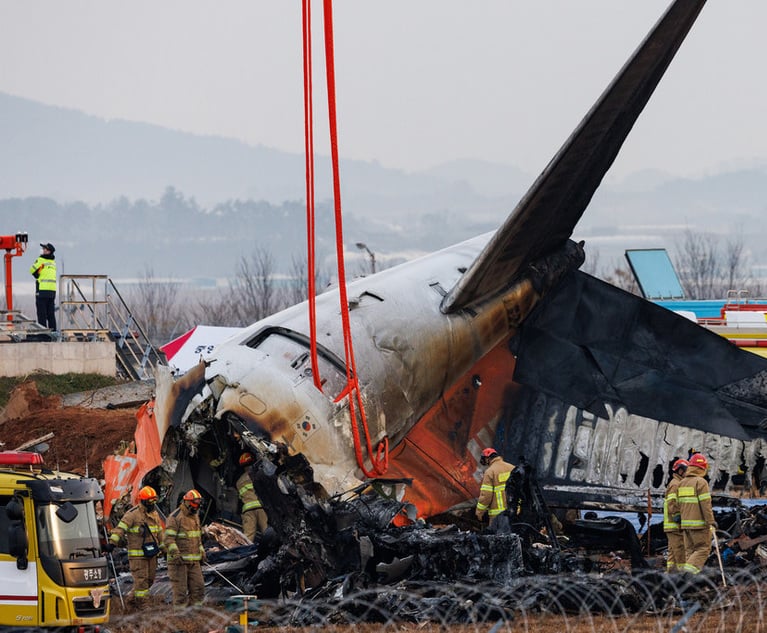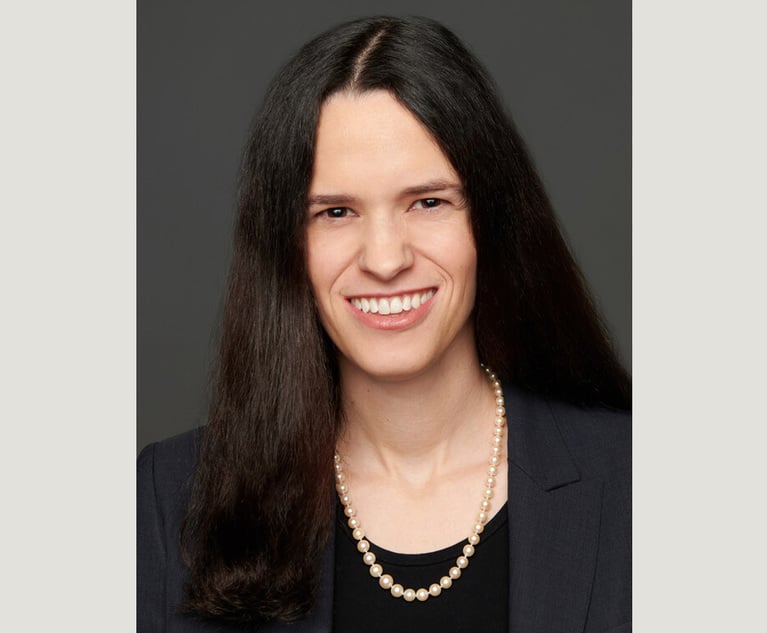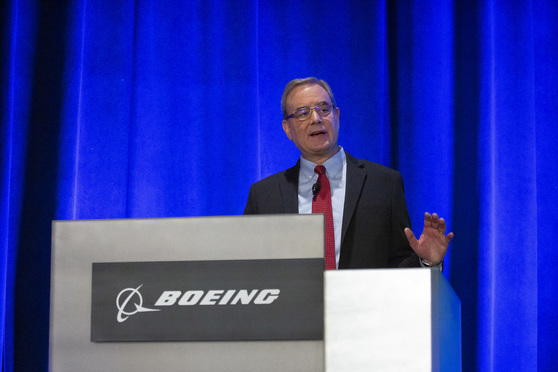Cotchett Pitre Teams Up to Sue Boeing on Behalf of Ethiopian Crash Victims' Families
“It is hard to believe that my entire family was wiped out in an incident in such a horrific way,” said Manant Vaidya, one of the plaintiffs, Monday. He lost 6 family members in the March 10 crash of a Boeing 737 Max 8 aircraft, which is now grounded.
April 29, 2019 at 04:39 PM
5 minute read
The original version of this story was published on Law.com
Two men who lost 10 family members in last month's crash of Ethiopian Airlines 302 filed lawsuits Monday against The Boeing Co., manufacturer of the grounded 737 Max 8 aircraft, as well as administrative claims against the Federal Aviation Administration.
Two plaintiffs' law firms, Chicago's Clifford Law Offices and Cotchett, Pitre & McCarthy of Burlingame, California, announced the 10 lawsuits at a press conference held hours after Boeing CEO Dennis Muilenburg apologized to crash victims and attempted to assure shareholders about the safety of its aircraft while skirting calls for his resignation.
“I, like many of you today, listened to Boeing and their CEO say as he began his press conference that he was sorry,” said Frank Pitre, of Cotchett Pitre. “And I think what we've heard today is there's a lot to question about the sincerity that Boeing has when it uses the words, 'I'm sorry.' If you look at the actions of Boeing, it portrays a very different picture.”
He continued: “I question, and I think these families here today, the sincerity behind the words 'I'm sorry.'”
Pitre called on Boeing's entire board to resign, and for Congress to investigate “serious problems” at the FAA.
The lawsuits involved two Canadian families in the Toronto area: Manant Vaidya, who lost his parents, his sister, her husband and their two children in the crash, and Paul Njoroge, whose wife and three children, including a 9-month-old daughter, died in the crash.
Both gave tearful statements at Monday's press conference.
“It is hard to believe that my entire family was wiped out in an incident in such a horrific way,” Vaidya said. “I lost three generations of my family: my parents, my sister, my nieces. If a person just lost one life, their whole life is shattered, but right now, with me, I'm completely lost.”
Vaidya's family was on vacation, while Njoroge's had planned to visit extended relatives in Kenya.
“I was left alone to lead an empty life, with pain and anguish. My life will never be the same,” Njoroge said. His other children were ages 6 and 4.
The Ethiopian Airlines flight, which killed 157 people on board after nosediving soon after takeoff, was the second involving the 737 Max 8. An Oct. 29 crash of Lion Air Flight 610 in Indonesia killed 189 people. The FAA grounded the aircraft days after the Ethiopian Airlines crash, but after 22 other countries had done so.
Earlier this month, the same two law firms filed a lawsuit on behalf of Samya Stumo, a U.S. passenger on the plane and niece of consumer advocate Ralph Nader.
Other lawsuits have been filed against Boeing over the Ethiopian Airlines crash, including one by another firm, Kline & Specter in Philadelphia, on behalf of the estate of Manisha Nukavarapu, a citizen of India. In a footnote in that lawsuit, Kline & Specter indicated it planned to bring an administrative complaint against the FAA.
Boeing became an immediate target following the crash. Lawsuits have linked the crashes to the Maneuvering Characteristics Augmentation Systems, or MCAS, an automated safety mechanism designed to prevent stalling that, under certain conditions, could push the aircraft into a nosedive. Monday's lawsuits also named Rosemount Aerospace Inc., a Minnesota-based unit of Farmington, Connecticut's United Technologies Corp. that manufactured the sensors.
In its quarterly report filed last week with the U.S. Securities and Exchange Commission, Boeing acknowledged the suits filed over both crashes and added, “we are fully cooperating with all ongoing governmental and regulatory investigations and inquiries relating to the accidents and the 737 MAX program.”
Lawsuits also insisted Boeing failed to property train pilots on the new software. Boeing originally had planned to complete a software upgrade by April but has since given no schedule on the fix.
Earlier this month, Boeing issued a statement: “We now know that the recent Lion Air Flight 610 and Ethiopian Airlines Flight 302 accidents were caused by a chain of events, with a common chain link being erroneous activation of the aircraft's MCAS function. We have the responsibility to eliminate this risk, and we know how to do it.”
Boeing continued: “We're also finalizing new pilot training courses and supplementary educational material for our global MAX customers. This progress is the result of our comprehensive, disciplined approach and taking the time necessary to get it right.”
But on Monday, Muilenburg “changed his tune,” Clifford Law's Kevin Durkin said, noting that the CEO had refused to answer whether Boeing was at fault.
“We are going to seek every single email, text message, that was between them and the FAA,” Durkin said Monday. “It will be our goal in this lawsuit to take that CEO's deposition, ask him questions about his 'shifting positions' on accepting responsibility for this tragedy.”
This content has been archived. It is available through our partners, LexisNexis® and Bloomberg Law.
To view this content, please continue to their sites.
Not a Lexis Subscriber?
Subscribe Now
Not a Bloomberg Law Subscriber?
Subscribe Now
NOT FOR REPRINT
© 2025 ALM Global, LLC, All Rights Reserved. Request academic re-use from www.copyright.com. All other uses, submit a request to [email protected]. For more information visit Asset & Logo Licensing.
You Might Like
View All
Lawsuit alleges racial and gender discrimination led to an Air Force contractor's death at California airfield
7 minute read
Aviation Attorney and Pilot Analyzes Jeju Air Crash, Potential Litigation Issues

In-House Moves of the Month: Boeing Loses Another Lawyer, HubSpot Legal Chief Out After 2 Years
5 minute read
SpaceX Sues California Coastal Commission, Alleging Political Bias Against CEO Elon Musk
Trending Stories
- 1Orrick Loses 10-Lawyer Team to Herbert Smith in Germany
- 2‘The US Market Is Critical’: KPMG’s Former Head of Global Legal Services On the Legal Arm of the Big Four Firm Entering the US
- 3Justice Marguerite Grays Elevated to Co-Chair Panel That Advises on Commercial Division
- 4McDermott Continues UK Growth With Another Partner Hire in London
- 52 Texas Lawyers Vie for Prominent Post: 2025-2026 Election
Who Got The Work
J. Brugh Lower of Gibbons has entered an appearance for industrial equipment supplier Devco Corporation in a pending trademark infringement lawsuit. The suit, accusing the defendant of selling knock-off Graco products, was filed Dec. 18 in New Jersey District Court by Rivkin Radler on behalf of Graco Inc. and Graco Minnesota. The case, assigned to U.S. District Judge Zahid N. Quraishi, is 3:24-cv-11294, Graco Inc. et al v. Devco Corporation.
Who Got The Work
Rebecca Maller-Stein and Kent A. Yalowitz of Arnold & Porter Kaye Scholer have entered their appearances for Hanaco Venture Capital and its executives, Lior Prosor and David Frankel, in a pending securities lawsuit. The action, filed on Dec. 24 in New York Southern District Court by Zell, Aron & Co. on behalf of Goldeneye Advisors, accuses the defendants of negligently and fraudulently managing the plaintiff's $1 million investment. The case, assigned to U.S. District Judge Vernon S. Broderick, is 1:24-cv-09918, Goldeneye Advisors, LLC v. Hanaco Venture Capital, Ltd. et al.
Who Got The Work
Attorneys from A&O Shearman has stepped in as defense counsel for Toronto-Dominion Bank and other defendants in a pending securities class action. The suit, filed Dec. 11 in New York Southern District Court by Bleichmar Fonti & Auld, accuses the defendants of concealing the bank's 'pervasive' deficiencies in regards to its compliance with the Bank Secrecy Act and the quality of its anti-money laundering controls. The case, assigned to U.S. District Judge Arun Subramanian, is 1:24-cv-09445, Gonzalez v. The Toronto-Dominion Bank et al.
Who Got The Work
Crown Castle International, a Pennsylvania company providing shared communications infrastructure, has turned to Luke D. Wolf of Gordon Rees Scully Mansukhani to fend off a pending breach-of-contract lawsuit. The court action, filed Nov. 25 in Michigan Eastern District Court by Hooper Hathaway PC on behalf of The Town Residences LLC, accuses Crown Castle of failing to transfer approximately $30,000 in utility payments from T-Mobile in breach of a roof-top lease and assignment agreement. The case, assigned to U.S. District Judge Susan K. Declercq, is 2:24-cv-13131, The Town Residences LLC v. T-Mobile US, Inc. et al.
Who Got The Work
Wilfred P. Coronato and Daniel M. Schwartz of McCarter & English have stepped in as defense counsel to Electrolux Home Products Inc. in a pending product liability lawsuit. The court action, filed Nov. 26 in New York Eastern District Court by Poulos Lopiccolo PC and Nagel Rice LLP on behalf of David Stern, alleges that the defendant's refrigerators’ drawers and shelving repeatedly break and fall apart within months after purchase. The case, assigned to U.S. District Judge Joan M. Azrack, is 2:24-cv-08204, Stern v. Electrolux Home Products, Inc.
Featured Firms
Law Offices of Gary Martin Hays & Associates, P.C.
(470) 294-1674
Law Offices of Mark E. Salomone
(857) 444-6468
Smith & Hassler
(713) 739-1250







